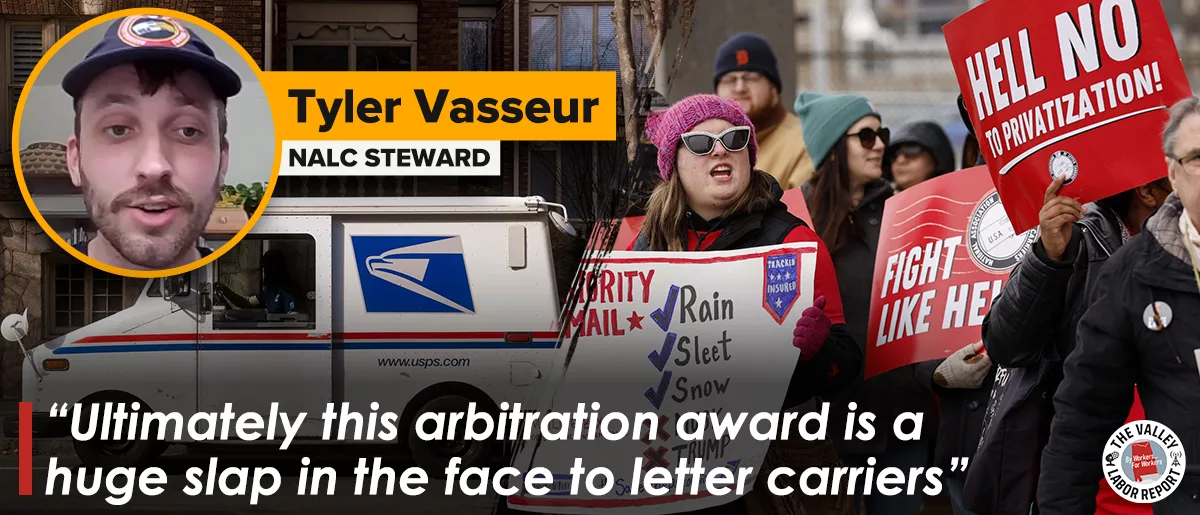Last week, on Monday, March 24, 2025, Arbitrator Dennis Nolan issued a final arbitration award after serving as neutral arbitration between the National Association of Letter Carriers (NALC) and the United States Postal Service (USPS) following their struggle to reach a mutually agreeable contract in February. The award sets the terms of a three-year collective-bargaining agreement.
But while NALC President Brian Renfroe has issued a statement largely praising this outcome, not all postal workers are pleased, and in fact many feel that it is a step in the wrong direction and ultimately oppositional to the union and the workers.
Tyler Vasseur is both a member and a steward of NALC Branch 9 based in Minneapolis, Minnesota, as well as Coordinating Committee Chair of Build A Fighting NALC (BFN), a growing group of members within the union who are fighting for reformation and seeking to give union members the voice they should already have. Tyler joined us this past Saturday to share his thoughts on the arbitration award.
“It’s essentially identical to the Tentative Agreement that we overwhelmingly rejected as NALC members by an over 2:1 margin a couple months ago— it’s essentially the same thing,” Tyler said. “Rather than the (current) general wage increase of 1.3%/1.3%/1.3% over the three-year life of the contract, it’s 1.3%, 1.4%, and 1.5%, and so if that’s not a slap in the face I don’t know what is, it amounts to a few cents extra an hour for the general wage increases.”
But the wages are far from being the only issue postal workers are concerned with; an ongoing struggle that NALC members have been protesting is the postal service overworking them, whether by working long hours, having too much work divided among too few people, or in some cases not being given enough time to focus on crucial preparation, meaning they have to work at an increased pace to make sure they finish within the unrealistic allotted time — all of this in an effort to “cut costs.”
“One of the biggest things is ‘one-hour office time,’ which is like, you only get one hour to organize your mail and route in the morning, and load up your truck and get out onto your route,” Tyler explained. “What that means is that they want to make the routes longer; less time in the office and be out on the routes longer, which means you’re in the elements longer, you’re walking longer, it’s more wear and tear on your body.”
Tyler went on to explain for reference that only on days when there is a minimal amount of deliveries to be made is he able to finish “office time” preparation within an hour, and even then, those days are few and far in between.
“Ultimately this arbitration award is a huge slap in the face to letter carriers,” Tyler stated. “And it doesn’t matter there was an expedited arbitration process because of the fears of privatization and wanting to get it done quickly, it’s clear that NALC, that Renfroe, went in there and didn’t— they didn’t actually have an arbitration case, they went in there already with an agreement with management, saying, ‘This is what we want the arbitration decision to be,’ because it took, what, a week?”
When asked why he thinks Arbitrator Nolan made this decision to not side more with the union and issue a clearly one-sided ruling, Tyler emphatically stated that he believed union leadership, in particular NALC President Brian Renfroe, went into the meeting “hand-in-hand” with management and essentially put pressure on the arbitrator to make a swift decision.
“Over the last six months, Renfroe was using essentially management talking points, that was shooting us in the foot… when he was trying to sell the Tentative Agreement, saying, ‘Look at all the money the postal service is losing, this is as best as we can do, the money needs to come from somewhere,’ you know, using all of these sorts of management talking points. And so that played a role.”
But there’s one other element that Tyler mused played a not insignificant role in this outcome: “It’s the general pressure of the moment under Trump, of the precarious footing for unions, the precarious sort of position that collective bargaining as a whole is under, and the attacks on collective bargaining from the Trump/Musk Administration. I think all of these things kind of combined… made the arbitrator probably more likely to say, ‘Yeah, let’s get this handled, let’s get this settled right away, who cares about the members of the union.’”
Watch our full interview with Tyler Vasseur:
